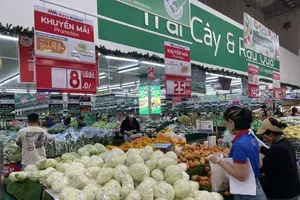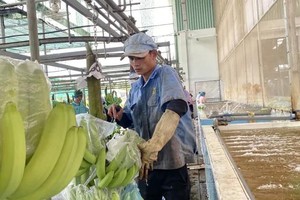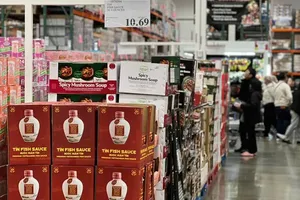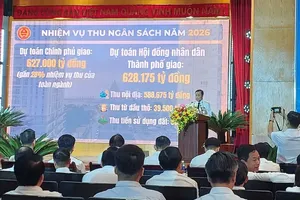
Yesterday afternoon, several traders at a clothing stall located in row A of An Dong market in An Duong Vuong Street of District 5 were instructing each other on how to make video live streaming to increase their sales. In the small space, many middle-aged customers are choosing pants and shirts of all kinds. The atmosphere in the market is so bustling that it was attracting lots of customers who were roaming in the market come to see.
The elderly woman in Tan Binh District who is a new customer of the Thai Trang stall revealed that she previously used to buy clothes at shopping centers or from her acquaintances. But once, she watched the video livestreaming of the Thai Trang stall in An Dong Market with many beautiful designs at affordable prices; so she went to the stall to choose clothes. Stall owner Ms. Thai Trang said that the stall sales sometimes dropped by 70 percent. Ms. Trang has her garment factory, specializing in designing for wholesale or retail orders.
Trang was worried because she did not want to let workers become unemployed, she learned how to make video livestreaming to increase sales by asking relatives or workers to play as streamers. Previously, she spent about VND1.5 million renting a model for performing five products, but she now cut down the expense by focusing on sales via social networks.

Customers who follow her live streaming are informed of fabric material and styles; subsequently, wholesale customers and retail customers gradually increased their orders after a few weeks of piloting the live stream, Ms. Thai Trang said. Those who come to her stall in An Dong Market are given a piece of advice on what style is suitable with them.
Currently, not only small traders at An Dong market, but their peers in other markets such as Binh Tay in District 6, and Tan Binh in Tan Binh District are also practicing selling on social networking platforms such as Zalo, Facebook, YouTube, and TikTok.
A 70-year-old trader Ung Thi Lien selling confectionery for about 50 years at Binh Tay market in District 6 said that sales performance in the market is poor whereas purchasing power through social networks has increased. Ms. Lien as well as some stalls that apply sales via social networks have seen a gradual increase in customers.
Some small businesses in the Ben Thanh market were also trained by TikTok to sell through live streaming to attract customers. A representative of the market management board said that the number of small businesses applying technology to adapt to new trends is increasing; thankfully, sales and revenue have gradually improved.
Similarly, traders at the Binh Tay market are familiar with selling goods through social networking sites while livestreaming at the market is not so popular because shop assistants are still confused about using new technology.
Economic experts say that the application of modern technology in advertising and sales is an inevitable trend. However, they also emphasized the check of the quality and origin of goods, to protect consumers’ rights.
Mr. Nguyen Ngoc Hoi, Deputy Director of the Ho Chi Minh City Department of Information and Communications, said that products and services are increasingly widely promoted on major commercial platforms, helping to pave the way for the promotion of the digital economy. However, online sales are also considered a performance, highly interactive and the government must take the lead to help traders comply with legal regulations.
Representative of TikTok Vietnam Nguyen Lam Thanh acknowledged that the program to promote products and services on e-commerce platforms with the government’s support is an opportunity for small businesses to get familiar with the form of selling through TikTok as well as other social networking sites, gradually creating jobs and increasing revenue.
Deputy Director of Ho Chi Minh City Institute for Development Studies Truong Minh Huy Vu also evaluated that e-commerce on social networks including video livestreaming to increase sales, has shown the potential for market share growth.
For instance, the recent broadcast of OCOP (one commune, one product program) in Can Gio outlying district with the participation of famous TikTokers, KOLs, and KOCs across the country, captured customer tastes, helping revenue increase about 10 times more than expected after only 5 hours of broadcasting.
Experts said e-commerce including online sales is a potential business industry that can achieve tens of billions of dollars in Ho Chi Minh City. For traditional markets, quick adaptation and timely business transformation are the only way out in the context of declining purchasing power. Additionally, small businesses also need to proactively improve service quality and ensure clear origins of commodities to retain customers.
























